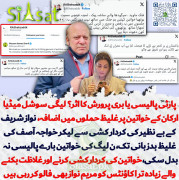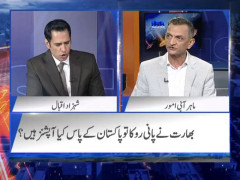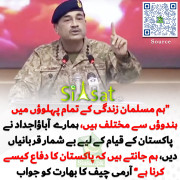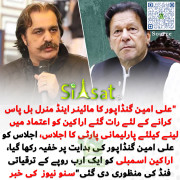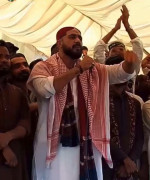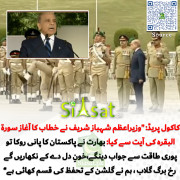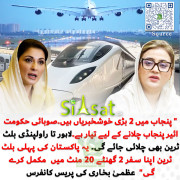You are using an out of date browser. It may not display this or other websites correctly.
You should upgrade or use an alternative browser.
You should upgrade or use an alternative browser.
Why we Pray(Nimaz) in Arabic and can not pray in our language (Urdu).
- Thread starter bravoawan
- Start date
uzairm
Senator (1k+ posts)
The question itself has no sense and shows ignorance.
We have to say Salat (Namaz) in Arabic because it is ordered so by our beloved Prophet (S.A.W.).
Its like asking that why we have to announce and recite Kalema-e-Tayyiba to become a Muslim.
OR why the Holy Book is in Arabic. And to understand it perfectly, we have to learn arabic. Or atleast try to learn Quran partially with its meanings. We learn English for higher studies, or learn a foreign language of a country while going their to persue professional education.
Admin, pls remove such stupid threads.
bro i agree questions like theses arise out of ignorance but ignorance can only be cured with education...so instead of getting angry educate ppl....u have knowledge share it...uwere blessed to be in an atmosphere of religious learning...lekin agar kisi ko wo atmosphere nahi mila to usai pyar sai samjhao
FaisalKh
Chief Minister (5k+ posts)
Actually whole Islamic teaching is in Arabic language. And it looks like Islam is designed for Arabic people. But b/c it is so old religion (some 1400 years old) so many things which does not make sense are also included in Islam and we cannot change. One of the biggest nonsense is that Islam claims to be religion for whole world but it was in Arabic language and hence can only be understood by a small no of people living in Arab. If Islam is a religion of whole world than God should reveal Quran in all languages that are spoken in this world or God should make all the world speak and understand one language.
I feel so sorry for u.... u tell me what is the ratio of arab/non arab muslims? how did the non arabs know and understood the deen Islam which was revealed according to u only for arabs? please use brain and think before u speak or write... ur next foolish logic would b why all people are not white or black and why some of the people are wealthy and some poor and why all of the people are not same etc.... u seriously need to think about it if u care about ur eemaan and if u r Muslim
Last edited:
Queue Farms
Banned
"seek knowledge even if u have to go to china"
This is Modou / Fabricated
TruPakistani
Minister (2k+ posts)
We pray in arabic to keep unity among all Muslims.
Quran is in arabic and so is the language of prayers.
If you change the language of Namaz, then all prayers will be changed to local languages and it will be very easy to distort the meanings. For example, due to this variance in tafseer different sects have risen just because of variation in translation.
Arabic is the language of the Quran and it should be the language of namaz and all prayers, to keep them pure and unchanged.
Quran is in arabic and so is the language of prayers.
If you change the language of Namaz, then all prayers will be changed to local languages and it will be very easy to distort the meanings. For example, due to this variance in tafseer different sects have risen just because of variation in translation.
Arabic is the language of the Quran and it should be the language of namaz and all prayers, to keep them pure and unchanged.
Someone in Pakistan tried to give Azan in punjabi and he translated ALLAHO AKBAR as ALLAH WUDA. It gave such a bad impression that people sitting there had to leave. This is just one example that there is no match to arabic. The beauty of Salat is only in Arabic. We should know the meaning of each word of Salat so that when reading it, understand what we are saying or asking from Allah Subhanahu watala. We also get reward when we follow the sunnah of our beloved Prophetpbuh by reading in the language of hepbuh he used.
||columbus||
Councller (250+ posts)
I have become Muslim, al-hamdu-Lillaah, but I do not know Arabic. What should I do with regard to the adhkaar (phrases praising Allaah) in the prayer and reading Qur’aan in Arabic? http://islamqa.com/en/ref/3471/arabic prayer
Praise be to Allaah.The majority of fuqaha’ say that if the non-Arab can speak Arabic, he should not recite Takbeer (saying “Allaahu akbar (Allaah is Most Great)”) in any other language. The evidence for this is that the texts instruct this particular wording, which is Arabic, and that the Prophet (peace and blessings of Allaah be upon him) did not do it any other way.
But if a non-Arab cannot speak Arabic and is unable to pronounce it, then according to the majority of fuqaha’ it is OK for him to say the Takbeer in his own language after it has been translated from Arabic, according to the statements of the Shaafa’is and Hanbalis, no matter what the language is. The Takbeer is remembrance or mentioning of Allaah, and Allaah can be remembered or mentioned in every language, so a language other than Arabic is an alternative, and the person has to learn how to say it in the other language. There is some controversy as to whether all of the adhkaar of the prayer, such as tashahhud, qunoot, du’aa’, and the tasbeehaat in rukoo’ and sujood may be said in languages other than Arabic.
With regard to reading Qur’aan, the majority say that it is not permissible to read it in any language other than Arabic. The evidence for this is the aayah (interpretation of the meaning):
“Verily, We have sent it down as an Arabic Qur’aan…” [Yoosuf 12:2]
Moreover, the Qur’aan is a miracle in its wording and its meaning; if it is changed, this is no longer the case, and it is no longer Qur’aan but an interpretation (tafseer). (al-Mawsoo’ah al-Fiqhiyyah, part 5: A’jami).
Ibn Qudaamah (may Allaah have mercy on him) said:
“Section: It is not right to read it in any language other than Arabic, or to substitute other words in Arabic, whether the person can read it well in Arabic or not, because Allaah says (interpretation of the meaning): “…an Arabic Qur’aan …’ [Yoosuf 12:2] and ‘In the plain Arabic language’ [al-Shu’ara’ 26:195]. The Qur’aan is a miracle in both its wording and its meaning, but if it is changed this is no longer the case, it is not Qur’aan or anything like it. It is only an interpretation (tafseer), and if the interpretation were like the Qur’aan itself, they would not be unable to meet the challenge of producing a soorah like it.
If a person cannot read well in Arabic, he has to learn. If he does not learn when he is able to, his prayers are not valid. If he is not able, or he fears that he does not have time to learn before the time for the next prayer is over, and he knows one aayah of al-Faatihah, he should repeat it seven times… If he can recite more than that, he should repeat it as much as he needs to make his recitation equivalent to the length of Soorat al-Fatihah, or he could make it up by reciting other aayaat. If he knows some aayaat he does not have to repeat, he could recite another aayah instead, because the Prophet (peace and blessings of Allaah be upon him) commanded the one who could not recite Qur’aan well to say ‘Al-Hamdu Lillaah (Praise be to Allaah)’ and other phrases, which is part of an aayah, but he did not command him to repeat it. If he cannot do anything, but he knows some of the Qur’aan by heart, he should recite whatever he can, and nothing else will do, because of the report narrated by Abu Dawood from Rifaa’ah ibn Raafi’, who said that the Prophet (peace and blessings of Allaah be upon him) said: “When you get up to pray, if you know some Qur’aan, recite it, otherwise say al-hamdu Lillaah (praise be to Allaah), and La ilaaha ill-Allaah (there is no god but Allaah), and Allaahu akbar (Allaah is Most Great).” This is more like Qur’aan, and is more appropriate (than any other words). He should also recite as much as he needs to make it equivalent in length to Soorat al-Faatihah. If he cannot recite anything of the Qur’aan, and cannot learn before it is too late to pray the current prayer, he should say Subhaan Allaah wa’l-hamdu Lillaah wa Laa ilaaha ill-Allaah wa Allaahu akbar wa Laa hawla wa laa quwwata illa Billaah (Glory be to Allaah; praise be to Allaah; there is no god but Allaah; Allaah is Most Great; and there is no strength and no power except with Allaah). Abu Dawood reported that a man came to the Prophet (peace and blessings of Allaah be upon him) and said: “I cannot learn anything of the Qur’aan. Teach me something that will suffice me.” He said, “Say Subhaan Allaah wa’l-hamdu Lillaah wa Laa ilaaha ill-Allaah wa Allaahu akbar wa Laa hawla wa laa quwwata illa Billaah.
Praise be to Allaah.The majority of fuqaha’ say that if the non-Arab can speak Arabic, he should not recite Takbeer (saying “Allaahu akbar (Allaah is Most Great)”) in any other language. The evidence for this is that the texts instruct this particular wording, which is Arabic, and that the Prophet (peace and blessings of Allaah be upon him) did not do it any other way.
But if a non-Arab cannot speak Arabic and is unable to pronounce it, then according to the majority of fuqaha’ it is OK for him to say the Takbeer in his own language after it has been translated from Arabic, according to the statements of the Shaafa’is and Hanbalis, no matter what the language is. The Takbeer is remembrance or mentioning of Allaah, and Allaah can be remembered or mentioned in every language, so a language other than Arabic is an alternative, and the person has to learn how to say it in the other language. There is some controversy as to whether all of the adhkaar of the prayer, such as tashahhud, qunoot, du’aa’, and the tasbeehaat in rukoo’ and sujood may be said in languages other than Arabic.
With regard to reading Qur’aan, the majority say that it is not permissible to read it in any language other than Arabic. The evidence for this is the aayah (interpretation of the meaning):
“Verily, We have sent it down as an Arabic Qur’aan…” [Yoosuf 12:2]
Moreover, the Qur’aan is a miracle in its wording and its meaning; if it is changed, this is no longer the case, and it is no longer Qur’aan but an interpretation (tafseer). (al-Mawsoo’ah al-Fiqhiyyah, part 5: A’jami).
Ibn Qudaamah (may Allaah have mercy on him) said:
“Section: It is not right to read it in any language other than Arabic, or to substitute other words in Arabic, whether the person can read it well in Arabic or not, because Allaah says (interpretation of the meaning): “…an Arabic Qur’aan …’ [Yoosuf 12:2] and ‘In the plain Arabic language’ [al-Shu’ara’ 26:195]. The Qur’aan is a miracle in both its wording and its meaning, but if it is changed this is no longer the case, it is not Qur’aan or anything like it. It is only an interpretation (tafseer), and if the interpretation were like the Qur’aan itself, they would not be unable to meet the challenge of producing a soorah like it.
If a person cannot read well in Arabic, he has to learn. If he does not learn when he is able to, his prayers are not valid. If he is not able, or he fears that he does not have time to learn before the time for the next prayer is over, and he knows one aayah of al-Faatihah, he should repeat it seven times… If he can recite more than that, he should repeat it as much as he needs to make his recitation equivalent to the length of Soorat al-Fatihah, or he could make it up by reciting other aayaat. If he knows some aayaat he does not have to repeat, he could recite another aayah instead, because the Prophet (peace and blessings of Allaah be upon him) commanded the one who could not recite Qur’aan well to say ‘Al-Hamdu Lillaah (Praise be to Allaah)’ and other phrases, which is part of an aayah, but he did not command him to repeat it. If he cannot do anything, but he knows some of the Qur’aan by heart, he should recite whatever he can, and nothing else will do, because of the report narrated by Abu Dawood from Rifaa’ah ibn Raafi’, who said that the Prophet (peace and blessings of Allaah be upon him) said: “When you get up to pray, if you know some Qur’aan, recite it, otherwise say al-hamdu Lillaah (praise be to Allaah), and La ilaaha ill-Allaah (there is no god but Allaah), and Allaahu akbar (Allaah is Most Great).” This is more like Qur’aan, and is more appropriate (than any other words). He should also recite as much as he needs to make it equivalent in length to Soorat al-Faatihah. If he cannot recite anything of the Qur’aan, and cannot learn before it is too late to pray the current prayer, he should say Subhaan Allaah wa’l-hamdu Lillaah wa Laa ilaaha ill-Allaah wa Allaahu akbar wa Laa hawla wa laa quwwata illa Billaah (Glory be to Allaah; praise be to Allaah; there is no god but Allaah; Allaah is Most Great; and there is no strength and no power except with Allaah). Abu Dawood reported that a man came to the Prophet (peace and blessings of Allaah be upon him) and said: “I cannot learn anything of the Qur’aan. Teach me something that will suffice me.” He said, “Say Subhaan Allaah wa’l-hamdu Lillaah wa Laa ilaaha ill-Allaah wa Allaahu akbar wa Laa hawla wa laa quwwata illa Billaah.
Last edited:
islamabadi6
Councller (250+ posts)
I thing all the religions of the world are outdated and does not make any sense in modern day life.
We already had traitors, ex-Pakistani's, Pakistani imposters and Taliban sympathizers on this site, the only ones missing were apostates but it looks like they have arrived as well...
FaisalKh
Chief Minister (5k+ posts)
This is Modou / Fabricated
:jazak::jazak::jazak: I was not aware of that Here is the correct narration:
The proven hadeeth is that which was narrated by Ibn Maajah from the hadeeth of Anas ibn Maalik, who said: “The Messenger of Allaah (peace and blessings of Allaah be upon him) said: ‘Seeking knowledge is obligatory upon every Muslim.’” (220. Classed as saheeh by al-Albaani in Saheeh Sunan Ibn Maajah. What is meant by knowledge here is knowledge of sharee’ah (Islamic knowledge). Al-Thawri said: “It is the knowledge for which no person has any excuse for not knowing.” And Allaah knows best.
Source http://islamqa.info/en/ref/13637
There are only two ways of life a)islamic and b)unislamic.
Once you choose one the other has to go. do kashtiyun ka sawaar doob jaata hai. Aur agar aik kashti par bhi sawaar hai aur us kashti main neeche soraakh hai to bhi sawaar doob jaaye ga.
namaaz aik unity peda karne waali cheez hai is main chand hi to baten jo aadmi asaani se yaad kar sakta hai.
baaqi jo dua aap ko karni hai khudaa ko jo kuchh bhi kehna hai aap chahaye jis zubaan main bhi kehen, is main koi rukaawat nahin hai.
I am grateful to people who teach arabic throughout the world, particularly voluntarily and freely and hope that one day message of islam really touches hearts and minds of people the way it should.
Once you choose one the other has to go. do kashtiyun ka sawaar doob jaata hai. Aur agar aik kashti par bhi sawaar hai aur us kashti main neeche soraakh hai to bhi sawaar doob jaaye ga.
namaaz aik unity peda karne waali cheez hai is main chand hi to baten jo aadmi asaani se yaad kar sakta hai.
baaqi jo dua aap ko karni hai khudaa ko jo kuchh bhi kehna hai aap chahaye jis zubaan main bhi kehen, is main koi rukaawat nahin hai.
I am grateful to people who teach arabic throughout the world, particularly voluntarily and freely and hope that one day message of islam really touches hearts and minds of people the way it should.
Last edited:
[h=2]Why Should a Muslim Offer Salat in Arabic?[/h]
بسم الله الرحمان الرحيم

Why Should a Muslim Offer Salat in Arabic?
BEING a universal religion, Islam is meant for all people with their different languages. Although Arabic is the language of the Qur'an and Islamic heritage, Islam did not aim at eradicating other languages that are mother tongues of Muslims in some parts of the globe.
Islam views the differences of human tongues as one of the Signs of Allah in His creation. This is proven by the fact that Arabic is not the native tongue of the majority of Muslims. However, Muslims are required to perform prayer in Arabic with few exceptions, as in case of new converts until they become able to say their prayers in Arabic, according to the Hanafi School of thought.
It is well known that during their service of worship (Salat), Muslims employ only the Arabic language: They recite certain passages of the Qur'an and pronounce certain formulae to attest to the sublimity of Allah and humility of man. This is done both by the Arabs and the non-Arabs, even by those who do not know a word of Arabic. Such was the case in time of the Prophet Muhammad (peace be upon him) and such has been the case to this day, whatever the country and the tongue of Muslims.
At first sight it may seem normal and even desirable that the faithful should address his prayer to the Lord in a way that he is fully conscious of what he says. Of course, the mother tongue is the medium best suited for the purpose, the worship being performed in as many languages as are spoken by the Muslim community. But a little deeper consideration shows that there are reasons that militate strongly against such a solution.
It is noteworthy that according to the Islamic belief the Qur'an is the Word of Allah, the recitation of which is considered as something meritorious. This is evident from the spiritual point of view. It stands as the faithful journey's unto the Lord through the sacred word of the Lord Himself. His Word is the path toward Him, something like a wire to conduct the electrical current that illuminates the bulb. The journey unto the Lord is of course the ultimate goal that every soul aspires to reach. The original Word has been revealed in Arabic: any translation would be a human work and human word, and this can scarcely serve the purpose of this mystical journey.
For those who would seek more mundane reasons, let us recall first that a clear distinction is to be made between prayer, in the sense of supplication (Du`aa), and the prayer in the sense of the service of worship (Salat), in so far as Du`aa is concerned — i.e., the prayer in general and outside the formal way of worshiping Allah, the tete-tete with the Lord (munajaat)— nobody has ever raised the slightest objection to the liberty of the individual to address one's need, one's petitions to the Lord in any language and in any physical posture one prefers. It is purely personal and private affair and concerns the relations of the individual creature directly with the Creator.
The Salat (prayer), on the contrary, is a collective and public affair, where the needs and requirements of other companions of the congregation are evidently to be taken into consideration. It is important to note that the Salat is in principle and preferably to be performed in common along with others (congregation): the Salat individually and in isolation is only tolerated and is never recommended, going to the congregational service is preferred. Let us see now more closely the diverse aspects of this collective and public act which is performed in the company of others.
Had Islam been a regional, racial or national religion, one would certainly have employed the current language of the region, of the race, of the nation. But quite different are the requirements of a universal religion, whose members speak hundreds of regional languages — of which each is incomprehensible to all the rest of the human groups — belonging to different races and regions of the earth. Our life today is getting more and more cosmopolitan, and practically every town has Muslims belonging to several linguistic groups, both from among the permanent residents and the travelers in transit, and has to take into consideration the aspect of courtesy and hospitality to strangers.
Supposing an Englishman goes to China and knows not a word of its language, and supposing he hears in the street something like "chen chu chih shan", evidently he would not understand what is meant by that; and if it is the regional translation of the well-known call to prayer, the Allah-o-Akbar, he would fail to perceive it and would miss the weekly prayer on Friday, or the congregational prayer of the moment.
Similarly a Chinese Muslim, traveling through other countries, would find nothing in common with his co-religionists if these others said their congregational worship in their local tongues. So a universal religion requires certain basic things to be common to all the faithful. A passing remark may be made about the fact that sometimes words of two different languages sound alike but have different meanings, at times the harmless word of one signifying something ridiculous or obscene in another. Such a risk is greater in languages with which one is utterly unfamiliar, and hears them only during a journey for example. This would be contrary to the dignity of the service of worship to Allah. Things familiar from childhood avoid such complications, even if the individual is a non-Arab and recites in Arabic the required formulae.
One cannot neglect the psychological aspect of human beings who have at times shown prejudices of xenophobia. Occasions would arise daily when political (national) or even personal and individual frictions would induce, for instance, an Englishman not to participate in the Salat led in French or Russian or some other language. Arabic, as the language of the Qur'an and the Hadith, has a respect and a halo in the minds of every Muslim, and one employs it not as the language of the Arabs but as the language of the Prophet Muhammad (peace be upon him), the language of the Mothers of the Faithful, the language Allah Himself has chosen for revealing His latest Word to us.
The needs of unity among the co-religionists can never be too much stressed upon. One should create new links to strengthen their ties of fraternity, rather than destroy those that already exist.
There is another aspect of the question which is no less important. In fact no translation ever replaces the original. There are for instance, nowadays numerous translations of the Holy Qur'an in English (as also in practically every language of the world), yet every now and then there are new and unceasing attempts to produce another translation, thinking that the older ones are partly defective. This is true not only of English but of every language of the world, and true also of the translation of any and every work. Should one utilize a defective thing or the perfect one, the translation or the original?
Let us recall in this connection that practically no religion, except Islam, possesses today integrally the original of the Revelation on which it is based, the original teaching of its founder: It is the translation, or at best fragments, of which dispose the Christian, Jewish, and other communities. How fortunate the Muslims are that they form an exception, and possess integrally the original **** of the Revelation, the Holy Qur'an!
One should not lose sight of the fact that in the entire Salat there are very few passages to recite. There are first the Adhan and Iqamah (call to prayer). Then inside the service of worship there are the formulae Allah-o-Akbar, Subhana rabbiyal-'azim, Subhana rabbial-a`la, the short chapter Al-Fatiha, two other short chapters, the Tashahhud, and that is all. The totality does not exceed a page or two, and most of the words of these ****s are commonly understood by the Muslim masses and have penetrated into all the languages of the Muslim countries, so much so that even a child or a beginner learns their meaning without pain or strain. And once the significance of these formulae is learnt, the Salat of a Muslim remains no more a mechanical recitation without understanding.
There is an aspect of Arabic language which merits to be brought into relief here. Apart from its incomparable musical qualities, the Arabic language itself, in its literary form, has changed since at least 1500 years neither in grammar, nor vocabulary, nor spelling, nor even pronunciation. Those who understand the language of Arabic newspapers and radio broadcasts today understand as perfectly the language of the Holy Qur'an. For a religion brought by the last of the Messengers of Allah and the Seal of the Prophets, and also destined for all times till the end of the world, is it not providential that the language selected for this Message should also be otherwise stable and unchanging?
Of course, there are provisions for exceptional cases, such as the needs of a new convert: immediately on his embracing Islam, he has to commence to perform the five daily services in which it is necessary to recite by heart the prescribed formulae. Until such time as he learns these formulae by heart, he may use their sense in any other language he can. For this we have the very high precedent of Salman Al-Farsi, who sent the translation of Al-Fatiha to some Persian converts, with the authorization of the Prophet Muhammad (peace be upon him) himself and they used it until their tongue got familiarized with the Arabic ****.

Ref: http://www.turntoislam.com/forum/showthread.php?t=23354
بسم الله الرحمان الرحيم

Why Should a Muslim Offer Salat in Arabic?
BEING a universal religion, Islam is meant for all people with their different languages. Although Arabic is the language of the Qur'an and Islamic heritage, Islam did not aim at eradicating other languages that are mother tongues of Muslims in some parts of the globe.
Islam views the differences of human tongues as one of the Signs of Allah in His creation. This is proven by the fact that Arabic is not the native tongue of the majority of Muslims. However, Muslims are required to perform prayer in Arabic with few exceptions, as in case of new converts until they become able to say their prayers in Arabic, according to the Hanafi School of thought.
It is well known that during their service of worship (Salat), Muslims employ only the Arabic language: They recite certain passages of the Qur'an and pronounce certain formulae to attest to the sublimity of Allah and humility of man. This is done both by the Arabs and the non-Arabs, even by those who do not know a word of Arabic. Such was the case in time of the Prophet Muhammad (peace be upon him) and such has been the case to this day, whatever the country and the tongue of Muslims.
At first sight it may seem normal and even desirable that the faithful should address his prayer to the Lord in a way that he is fully conscious of what he says. Of course, the mother tongue is the medium best suited for the purpose, the worship being performed in as many languages as are spoken by the Muslim community. But a little deeper consideration shows that there are reasons that militate strongly against such a solution.
It is noteworthy that according to the Islamic belief the Qur'an is the Word of Allah, the recitation of which is considered as something meritorious. This is evident from the spiritual point of view. It stands as the faithful journey's unto the Lord through the sacred word of the Lord Himself. His Word is the path toward Him, something like a wire to conduct the electrical current that illuminates the bulb. The journey unto the Lord is of course the ultimate goal that every soul aspires to reach. The original Word has been revealed in Arabic: any translation would be a human work and human word, and this can scarcely serve the purpose of this mystical journey.
For those who would seek more mundane reasons, let us recall first that a clear distinction is to be made between prayer, in the sense of supplication (Du`aa), and the prayer in the sense of the service of worship (Salat), in so far as Du`aa is concerned — i.e., the prayer in general and outside the formal way of worshiping Allah, the tete-tete with the Lord (munajaat)— nobody has ever raised the slightest objection to the liberty of the individual to address one's need, one's petitions to the Lord in any language and in any physical posture one prefers. It is purely personal and private affair and concerns the relations of the individual creature directly with the Creator.
The Salat (prayer), on the contrary, is a collective and public affair, where the needs and requirements of other companions of the congregation are evidently to be taken into consideration. It is important to note that the Salat is in principle and preferably to be performed in common along with others (congregation): the Salat individually and in isolation is only tolerated and is never recommended, going to the congregational service is preferred. Let us see now more closely the diverse aspects of this collective and public act which is performed in the company of others.
Had Islam been a regional, racial or national religion, one would certainly have employed the current language of the region, of the race, of the nation. But quite different are the requirements of a universal religion, whose members speak hundreds of regional languages — of which each is incomprehensible to all the rest of the human groups — belonging to different races and regions of the earth. Our life today is getting more and more cosmopolitan, and practically every town has Muslims belonging to several linguistic groups, both from among the permanent residents and the travelers in transit, and has to take into consideration the aspect of courtesy and hospitality to strangers.
Supposing an Englishman goes to China and knows not a word of its language, and supposing he hears in the street something like "chen chu chih shan", evidently he would not understand what is meant by that; and if it is the regional translation of the well-known call to prayer, the Allah-o-Akbar, he would fail to perceive it and would miss the weekly prayer on Friday, or the congregational prayer of the moment.
Similarly a Chinese Muslim, traveling through other countries, would find nothing in common with his co-religionists if these others said their congregational worship in their local tongues. So a universal religion requires certain basic things to be common to all the faithful. A passing remark may be made about the fact that sometimes words of two different languages sound alike but have different meanings, at times the harmless word of one signifying something ridiculous or obscene in another. Such a risk is greater in languages with which one is utterly unfamiliar, and hears them only during a journey for example. This would be contrary to the dignity of the service of worship to Allah. Things familiar from childhood avoid such complications, even if the individual is a non-Arab and recites in Arabic the required formulae.
One cannot neglect the psychological aspect of human beings who have at times shown prejudices of xenophobia. Occasions would arise daily when political (national) or even personal and individual frictions would induce, for instance, an Englishman not to participate in the Salat led in French or Russian or some other language. Arabic, as the language of the Qur'an and the Hadith, has a respect and a halo in the minds of every Muslim, and one employs it not as the language of the Arabs but as the language of the Prophet Muhammad (peace be upon him), the language of the Mothers of the Faithful, the language Allah Himself has chosen for revealing His latest Word to us.
The needs of unity among the co-religionists can never be too much stressed upon. One should create new links to strengthen their ties of fraternity, rather than destroy those that already exist.
There is another aspect of the question which is no less important. In fact no translation ever replaces the original. There are for instance, nowadays numerous translations of the Holy Qur'an in English (as also in practically every language of the world), yet every now and then there are new and unceasing attempts to produce another translation, thinking that the older ones are partly defective. This is true not only of English but of every language of the world, and true also of the translation of any and every work. Should one utilize a defective thing or the perfect one, the translation or the original?
Let us recall in this connection that practically no religion, except Islam, possesses today integrally the original of the Revelation on which it is based, the original teaching of its founder: It is the translation, or at best fragments, of which dispose the Christian, Jewish, and other communities. How fortunate the Muslims are that they form an exception, and possess integrally the original **** of the Revelation, the Holy Qur'an!
One should not lose sight of the fact that in the entire Salat there are very few passages to recite. There are first the Adhan and Iqamah (call to prayer). Then inside the service of worship there are the formulae Allah-o-Akbar, Subhana rabbiyal-'azim, Subhana rabbial-a`la, the short chapter Al-Fatiha, two other short chapters, the Tashahhud, and that is all. The totality does not exceed a page or two, and most of the words of these ****s are commonly understood by the Muslim masses and have penetrated into all the languages of the Muslim countries, so much so that even a child or a beginner learns their meaning without pain or strain. And once the significance of these formulae is learnt, the Salat of a Muslim remains no more a mechanical recitation without understanding.
There is an aspect of Arabic language which merits to be brought into relief here. Apart from its incomparable musical qualities, the Arabic language itself, in its literary form, has changed since at least 1500 years neither in grammar, nor vocabulary, nor spelling, nor even pronunciation. Those who understand the language of Arabic newspapers and radio broadcasts today understand as perfectly the language of the Holy Qur'an. For a religion brought by the last of the Messengers of Allah and the Seal of the Prophets, and also destined for all times till the end of the world, is it not providential that the language selected for this Message should also be otherwise stable and unchanging?
Of course, there are provisions for exceptional cases, such as the needs of a new convert: immediately on his embracing Islam, he has to commence to perform the five daily services in which it is necessary to recite by heart the prescribed formulae. Until such time as he learns these formulae by heart, he may use their sense in any other language he can. For this we have the very high precedent of Salman Al-Farsi, who sent the translation of Al-Fatiha to some Persian converts, with the authorization of the Prophet Muhammad (peace be upon him) himself and they used it until their tongue got familiarized with the Arabic ****.

Ref: http://www.turntoislam.com/forum/showthread.php?t=23354
© Copyrights 2008 - 2025 Siasat.pk - All Rights Reserved. Privacy Policy | Disclaimer|

